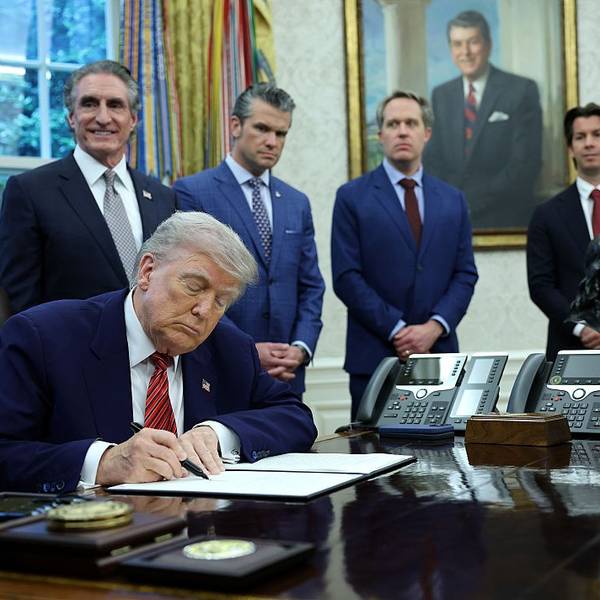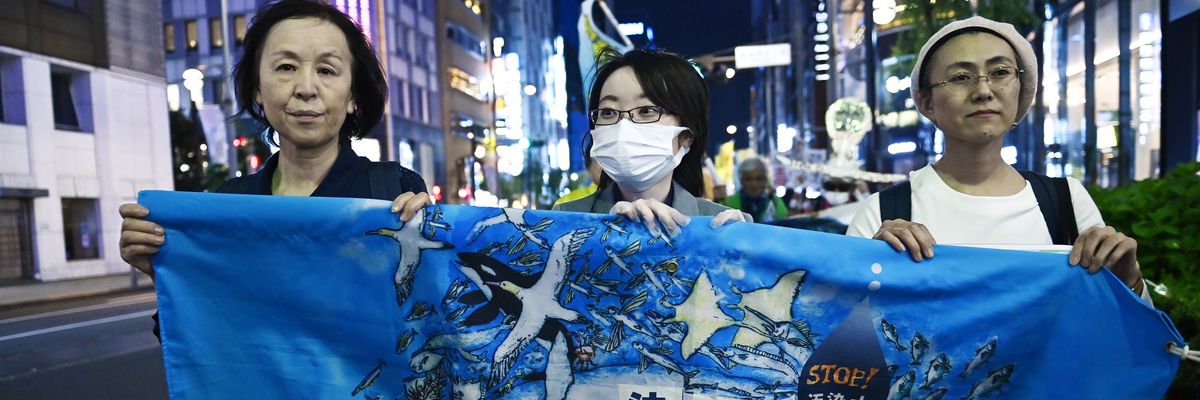Critics of a Japanese plan to release filtered radioactive wastewater from the Fukushima nuclear disaster into the Pacific Ocean intensified their opposition to the proposal on Wednesday after the United Nations agency responsible for promoting nuclear energy said the company that operated the plant has adequately demonstrated its ability to measure the water's radioactivity.
The U.N.'s International Atomic Energy Agency (IAEA) this week released a report that found the Tokyo Electric Power Company (TEPCO)—the operator of the Fukushima Daiichi Nuclear Power Station that was catastrophically damaged during a 2011 meltdown in three reactors caused by an earthquake and tsunami—"has demonstrated its capabilities for accurate and precise measurements of the radionuclides present in the treated water stored on site."
While proponents of the Japanese government's 2021 proposal to gradually release more than 1 million metric tons of filtered Fukushima wastewater into the Pacific view the IAEA's latest findings as a milestone on the road toward realizing the plan, opponents renewed their calls to keep the radioactive water out of the ocean.
"It's applying a 19th-century 'dilution is the solution to pollution' approach to a problem that really should be dealt with in a much more modern way."
"Piping water into the sea is an outrage. The sea is not a garbage dump," 71-year-old Haruo Ono, who has been fishing off the coast of Fukushima his entire life, told CBS News. "The company says it's safe, but the consequences could catch up with us 50 years down the road."
Kinzaburo Shiga, a 77-year-old, third-generation fisher from Fukushima, told CNN the government's plan makes his "blood boil."
"I know that the government has decided to go ahead with the policy of releasing treated wastewater into the sea, but for us fishers, it really feels like they made this decision without our full consent," he said.
Fears of radioactive contamination from the planned wastewater release have prompted protests from the governments of China, South Korea, some Pacific island nations, and international environmental groups like Greenpeace, which argues the proposal violates international law.
"Continuing with ocean discharge plans at this time is simply inconceivable," Henry Puna, secretary general of the Pacific Islands Forum intergovernmental group, wrote earlier this year. "I fear that, if left unchecked, the region will once again be headed towards a major nuclear contamination disaster at the hands of others."
Lee Jae-myung, a South Korean opposition lawmaker from the centrist Democratic Party, said earlier this month that "Japan is putting forward claims that the contaminated water from the Fukushima nuclear power plant, if treated, is safe enough to drink."
"If it is safe enough to drink, they should use it as drinking water," he added.
Last week, a team of 21 South Korean nuclear experts visited the Fukushima site to inspect equipment and facilities that would be used during the proposed wastewater release.
"This visit has made significant progress in the process of scientific and technological review through direct on-site confirmation and more detailed data acquisition, but additional analysis and confirmation work is planned for more precise judgment," said Yoo Gook-hee, head of the inspection team, according to World Nuclear News. "Based on this, we plan to comprehensively evaluate Japan's plans for Fukushima-related water pollution and disclose the results."
The Korea Herald reported Wednesday that the team of experts would conduct an additional review.
The wastewater release plan has also sparked popular protests in South Korea, where 85% of people oppose the proposal, according to a survey released last week by the Korea Federation for Environmental Movements.
"The Pacific Ocean is not some dump where contaminated water from Fukushima can be deposited. Japan must comply with [United Nations] conventions and the U.N.'s vision of protecting the oceans," a coalition of South Korean activists said in a statement ahead of a May 22 demonstration in Seoul's Gwanghwamun Plaza, according to The Hankyoreh.
"Since the Pacific is the largest ocean in the world, pollution in the Pacific would soon spread to every ocean in the world," the activists added.
Common Dreams reported in 2012 that fish contaminated with radioactive cesium from Fukushima were found off the California coast months after the disaster.
Nuclear and public health experts have also weighed in against dumping radioactive wastewater into the ocean, even as others argued the plan poses "zero risk to human life."
Tilman Ruff, an Australian infectious diseases and public health physician who co-founded of the Nobel Peace Prize-winning International Campaign to Abolish Nuclear Weapons, said during a Friday Australian Broadcasting Corporation interview that dumping Fukushima water into the Pacific would be "a really unfortunate regressive step."
"It's applying a 19th-century 'dilution is the solution to pollution' approach to a problem that really should be dealt with in a much more modern way," he continued. "They haven't really considered adequate alternatives to store this water to use it in ways that don't have long-term transboundary and transgenerational impacts across the Pacific."
Ruff said the best course of action would be to "clean the water as best you can, then use it in concrete for structural applications like building foundations, bridges, under roads, where it's not gonna have a lot of contact with people, and where some of the important radioactive releases… will be trapped in the concrete, where it's much safer."
"There are also options of long-term storage, because radioactive materials decay over time," he added.
Marcos Orellana, the United Nations special rapporteur on the implications for human rights of the environmentally sound management and disposal of hazardous substances and wastes, told Al Jazeera earlier this month that he does not believe the IAEA is the neutral body it claims to be.
"The IAEA has a mandate to accelerate and enlarge peaceful atomic energy," he said. "Why would the IAEA, on the same day that Japan announced its decision to discharge the contaminated water... come out publicly in support of Japan?"
"How this impacts the food chain, how this impacts human health, this is not at all clear," Orellana added. "Alternatives are expensive, but even more expensive is the cost of contaminating the Pacific Ocean for hundreds of years with radioactive substances."




